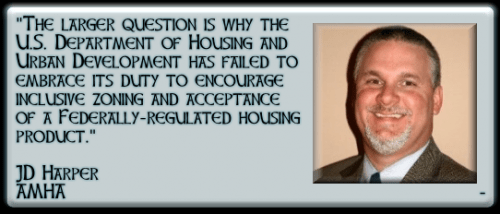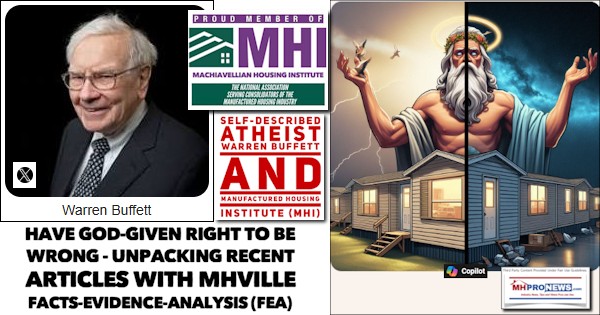
Because preemption is what allows a HUD code manufactured home (MH) to be built to a performance based standard proven to save consumers time and money, while protecting durability, and homeowner safety.
The enforcement of manufactured home preemption could open hundreds of thousands of new MH sales every year for manufactured housing retailers. That would in turn make more affordable housing options a reality for millions over time.
For those who worry that manufactured homes could reduce the property values of home owners, MHLivingNews spotlighted how HUD’s own PD&R report proves differently. University level research proves that manufactured homes and conventional housing in several cities are proven to have appreciated side-by-side.
Donald Tye, Jr’s family and neighbors’ experiences place a human face on that reality. Tye’s story also underscores the transformation possible for millions otherwise trapped “like cattle” in what he called “tenements,” if quality, affordable factory-crafted manufactured homes are made available in urban areas to singles and households of modest means.
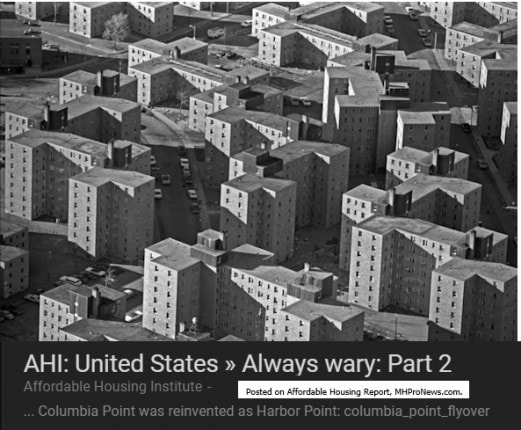

No less a famous personality than HUD Secretary, Dr. Ben Carson has made a similar point to Tye’s. Carson has said several times that home owning households have an average $200,000 average net worth. Meanwhile, HUD’s Secretary states that the average net worth of renters is only $5000 per household.
Carson has also said he sees the value of manufactured homes in rural areas. What is unclear at present is this question. Is Carson familiar with HUD’s own PD&R report, linked above, or the transformational power of enhanced preemption that the Manufactured Housing Improvement Act of 2000 (MHIA 2000) law calls for already?
So, enforcing manufactured home (MH) preemption could restore the American Dream for millions otherwise trapped in renting. It can do so with little or no cost to federal taxpayers. It is obviously in keeping with the Trump Administration’s call for public/private partnerships to save federal tax dollars, while creating opportunities for businesses that create more-higher paying jobs.
The View of a Texan
If federal preemption means something, it’s that it preempts local and state housing codes.
Joe A. Garcia is the Executive Director, Manufactured Housing Division in the Texas Department of Housing & Community Affairs (TDHCA).
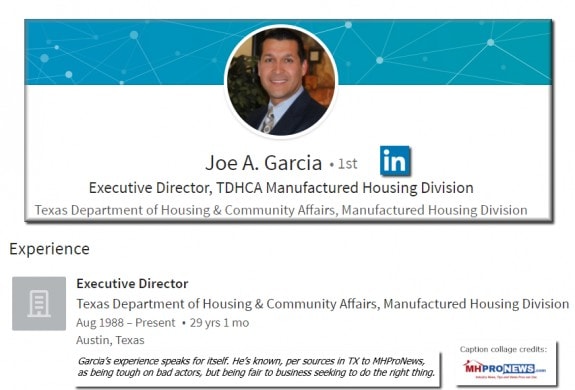
Garcia has said publicly that when asked by a local jurisdiction, he stresses how he would testify if asked about a manufactured home placement issue. Garcia has bluntly said that federal preemption means what it says.

Yet, 17 years after the Manufactured Housing Improvement Act of 2000 (MHIA 2000) – which strengthened preemption, by referring to it as “enhanced preemption” – why do we still see so many local jurisdictions fight the plain meaning of the law?

NIMBY and ignorance are part of the answer. But is there more?
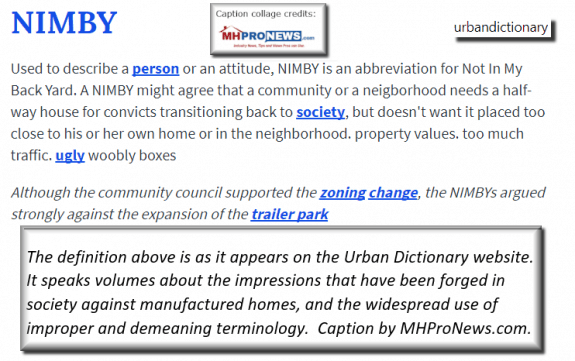
“Follow the money.” “Pay more attention to what people do than what they say.” Those favorite points of MHI award winner Marty Lavin, JD, may prove useful in the analysis of the video interview with Pam Danner, shown below.

AMHA’s Harper on Preemption
JD Harper told MHProNews last December that “…most [in Arkansas] cities view factory-built structures through the same prism as billboards, cell towers and sexually-oriented businesses… something to be avoided if at all possible, but restricted and heavily regulated if allowed at all.”
Harper, a twenty year industry veteran, is the executive director of the Arkansas Manufactured Housing Association (AMHA). He is not alone in that assessment.
In fact, Harper’s view is so common that Lavin has paradoxically referred to the technically preemptive HUD Code as a “discrimination code.”
That discrimination plays out in states across the nation. MHLivingNews spotlighted cases in Georgia and Texas, in the report, “Local Star Chambers Wage War on Affordable Housing.”

In that linked report, Jay Hamilton and Gary Adamek, among other industry professionals, shared their experiences in fighting local zoning challenges.
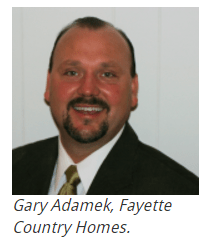
Harper has sounded the alarm on repeated occasions to defend preemption.
In a detailed letter to HUD with commentary to MHProNews, Harper called upon HUD and Pam Danner, the administrator for the Office of Manufactured Housing Programs, to task for not enforcing federal preemption.
As an industry wag has quipped, “where else in the federal government can you find an official fighting not to go to the letter of their authority, and beyond?!”
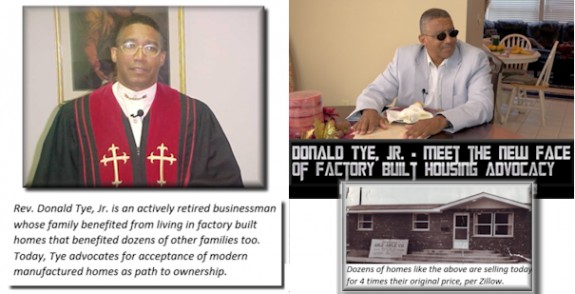
As a HUD insider source told MHLivingNews, HUD had an attorney who allegedly for 30 years failed to aggressively enforce preemption, as the enhanced preemption in MHIA calls for…why?
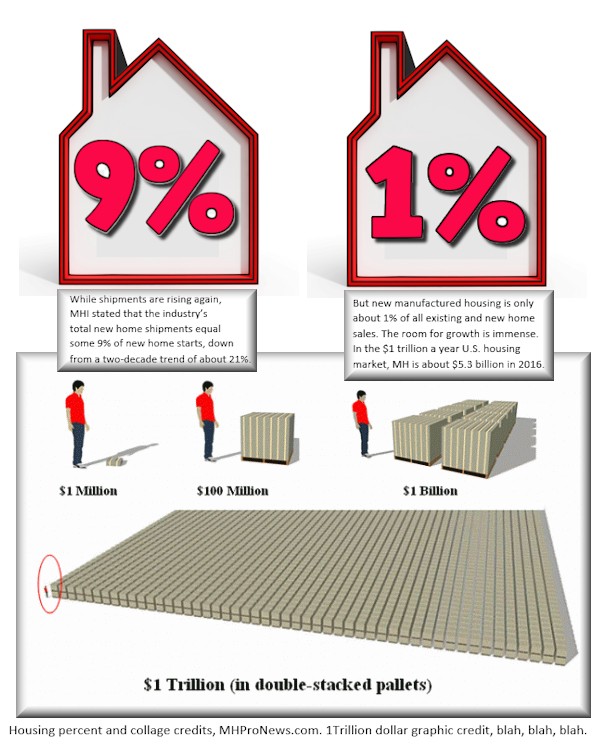
Interview with HUD’s MH Program Administrator, Pamela Beck Danner, JD
The video posted further below, is an ‘interview’ by Suzanne Felber of Danner. Note as a disclaimer that MHProNews is not promoting either Felber, or her AHA agenda, by showing this video.
Rather, the Daily Business News (DBN) on MHProNews presents this as a unique opportunity to see the real Danner, and a Manufactured Housing Institute (MHI) surrogate in action, in their own setting and words.
There are a variety of interview methods professionals may employ. The interview style in the video below might be described as a ‘fawning fan’ interview. That is made clear by Felber’s closing comments.
Note that sources tell MHProNews that Suzanne Felber and her partner draw financial benefit from MHI, directly and indirectly. This publication has already previously noted Felber gushing over MHI President, Richard “Dick” Jennison (see example, linked here).
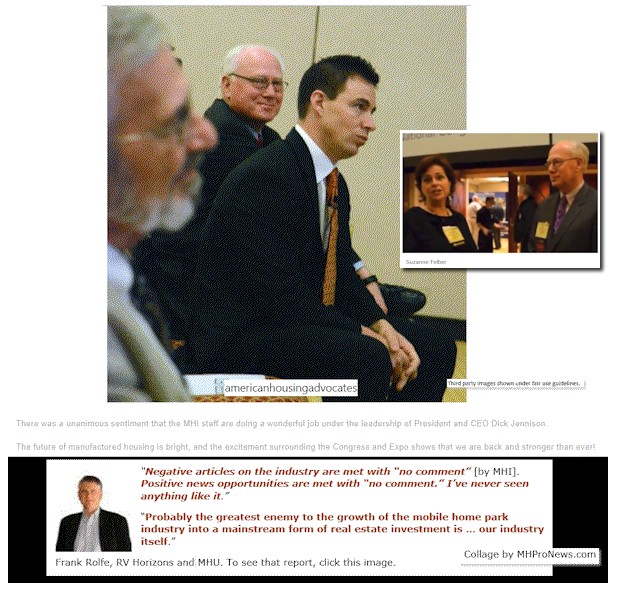
Defining Commentary
Critical analysis, “fisking,” and critiques are among the phrases used by journalists and others to describe “fact checking” a person’s or organization’s statements. They often look at possible motives too.

Against this backdrop, note that Danner uses the term preemptive or preemption in this video, to describe her authority at HUD. Rightly so. Then, why – as Harper and so many others ask – does she fail to use it properly? Why has she refused to reply to MHProNews when we directly asked her about preemption, but will reply to us on more mundane issue?
An electronic transcript of the video above is available as a download, linked here.
No publisher in manufactured housing history has devoted more time to spotlighting the fact that billionaires, millionaires, rich and famous people – along with all other socio-economic classes – have embraced manufactured homes. HUD’s own data proves manufactured homes are high quality, with just a fraction of 1 percent going to dispute resolution.
So what’s the hang-up with Danner at HUD making enhanced preemption a reality, when affordable housing is in crisis?
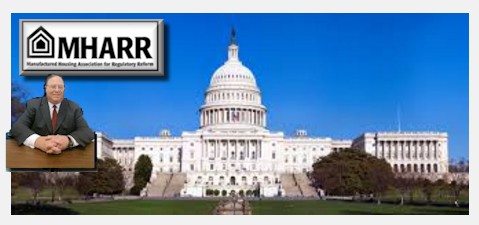
Does a new Industry in Focus report document in Chairman Tim Williams’ own words a clear disconnect between what MHI leadership says, and what it does?
An off-the-record message from an industry veteran and organizational leader, to MHProNews this weekend stated as follows.
“The more I see and hear, the more I think Lois has been interviewing for a job with Pam Danner for the last two to three years. I hope my instinct is wrong, because I have always found Lois down to earth and approachable (compared to others). I’m starting to feel like the industry has been set up for the final knockout punch by HUD and we were just caught not paying attention. Kind of like an old dog rolling over on his back to be petted by his master and instead finds himself in a small cage headed to the Vet’s office to be put to sleep.”
In an insightful comment from a federal official, linked below, we’re told from an inside the beltway vantage point what HUD is really all about.
At the end of that DBN article, Tye reacts by saying, “The system is rigged.” ## (News, analysis, commentary.)
“We Provide, You Decide.”
(Image credits are as shown above, and when provided by third parties, are shared under fair use guidelines.)

Note Kovach is a member of LifeStyle Factory Homes, LLC, the parent operation to MHProNews and MHLivingNews.com, and other MH Industry marketing and professional service.

